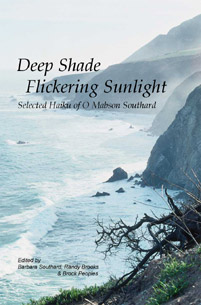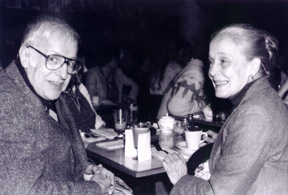Deep Shade Flickering Sunlight
Selected Haiku of O Mabson Southard
edited by Barbara Southard
and Randy Brooks
Brock Peoples, student editor
O. Mabson Southard
Deep Shade Flickering Sunlight
Selected Haiku of O Mabson Southard
ISBN 1-929820-05-4 • perfectbound • March 2004 • 128
pages (5.5" X 8.5") • $16.00 US
Brooks Books is pleased to offer another Goodrich Haiku Masters edition
featuring outstanding English-language haiku poets with the publication
of Deep Shade Flickering Sunlight: Selected Haiku of O Mabson Southard.
This collection includes the very best work by one of the leading
pioneers exploring the art of haiku in English in the 1960’s
and 1970’s. Southard spent a significant portion of his life’s
literary work developing his approach to the genre. It is our hope
that readers will enjoy these top-quality haiku and develop an appreciation
for Southard’s significant contributions to the art of haiku
in English. O Mabson Southard has continued to receive critical acclaim
and the recognition he deserves in anthologies of haiku, but most
of his work is out of print or in magazines which are difficult to
find. With this collection, his work can now be more fully considered
by haiku scholars and enjoyed by contemporary haiku readers.
—Randy Brooks, Editor & Publisher
Brooks Books
|

ISBN: 1-929820-05-4
$16.00 plus $3.00 postage from:
Brooks Books
6 Madera Court
Taylorville, IL 62568
Or order by credit card online:
Email us about postage costs for Canada
or International orders. |
|
Under the live oak:
deep shade, flickering sunlight—
and a wild turkey
|
On the top fence rail
he lights, knocking off some snow—
a common
sparrow
|
- About the Author:
 The
poet was a man known by many names. He was born Ordway Southard, but
during his stay in the Hawaiian Islands in the sixties, he and his
wife, Mary, adopted Hawaiian names, O for Ordway and Malia for Mary.
Somewhat later, under the influence of feminist thought, O Southard
became disenchanted with the use of the patronymic, Southard. He then
became Mabelsson Norway (Mabel was his mother’s name and Norway
was her pet name for him in childhood). His last published works appeared
under the name O Mabson Southard. The
poet was a man known by many names. He was born Ordway Southard, but
during his stay in the Hawaiian Islands in the sixties, he and his
wife, Mary, adopted Hawaiian names, O for Ordway and Malia for Mary.
Somewhat later, under the influence of feminist thought, O Southard
became disenchanted with the use of the patronymic, Southard. He then
became Mabelsson Norway (Mabel was his mother’s name and Norway
was her pet name for him in childhood). His last published works appeared
under the name O Mabson Southard.
Ordway was born in Cambridge, Massachusetts on November 29, 1911.
He came from an old New England family that traced their ancestry
on both sides back to English migrants of the early seventeenth century.
His mother’s father, Horace Austin, was governor of Minnesota
in the late nineteenth century, and Mabel Austin was educated at Oberlin
and later took her M.D. at Johns Hopkins at a time when there were
few women doctors. She married Elmer Ernest Southard, a professor
of psychiatry at Harvard, and the couple had two boys and a girl.
Southard strongly believed that haiku should be based on concrete
experience, and his keen observation of nature was cultivated in the
course of frequent wanderings in the wilderness. He rejected literary
criticism that emphasized the symbolic in his poetry. Whatever symbolism
might be construed by others, the poet avowed that the verses he wrote
flowed from concrete moments of enhanced sensibility. Southard was
convinced that the capacity of our senses to perceive the natural
world must be cultivated by living simply. The individual caught in
the pursuit of ambition and material possessions has neither the time
nor the inclination to do so. According to the poet, it is independence
of mind and heart that allows feelings to flow deep and true.
—Barbara Southard
|
- Comments from previous reviews and editors:
“The sharp clarity and depth of his images—the rocks and tree
coming out of the mist in his well-known “old rooster” haiku,
the loon's cry crossing the still lake, the sparrow knocking snow from
a fence-rail, the dogwood petal carrying its moonlight into the darkness—these
and many more will ensure that his name (or names) will endure as long
as there are readers of haiku.”
The Haiku Anthology—Cor van den Heuvel, Editor—Cor
van den Heuvel, Editor |
- O Southard was extremely active during the sixties and early seventies.
His work was influential on many poets during the early years of
haiku in America. Southard expresses a disdain for symbolic readings.
…In a letter to Helen Chenoweth published in Haiku West in
July 1971 he says, “The words of poetry mean things. But for
me poetic symbols are merely verbal; the things meant do not mean
other things. In the glare of academic symbolism, the subtle inner
light that a verse may throw is surely lost…” In this
statement we can detect Southard’s immanentist poetics. Like
Thoreau’s speculation in A Week that “Nature, rightly
read, [is] that of which she is commonly taken to be the symbol
merely,” Southard implies that nature, both in its own domain
as well as in his haiku, is the source of its own significance.
—Tom Lynch, from his dissertation,
An Original Relation to the Universe:
A Study of North American Haiku
|

 The
poet was a man known by many names. He was born Ordway Southard, but
during his stay in the Hawaiian Islands in the sixties, he and his
wife, Mary, adopted Hawaiian names, O for Ordway and Malia for Mary.
Somewhat later, under the influence of feminist thought, O Southard
became disenchanted with the use of the patronymic, Southard. He then
became Mabelsson Norway (Mabel was his mother’s name and Norway
was her pet name for him in childhood). His last published works appeared
under the name O Mabson Southard.
The
poet was a man known by many names. He was born Ordway Southard, but
during his stay in the Hawaiian Islands in the sixties, he and his
wife, Mary, adopted Hawaiian names, O for Ordway and Malia for Mary.
Somewhat later, under the influence of feminist thought, O Southard
became disenchanted with the use of the patronymic, Southard. He then
became Mabelsson Norway (Mabel was his mother’s name and Norway
was her pet name for him in childhood). His last published works appeared
under the name O Mabson Southard.